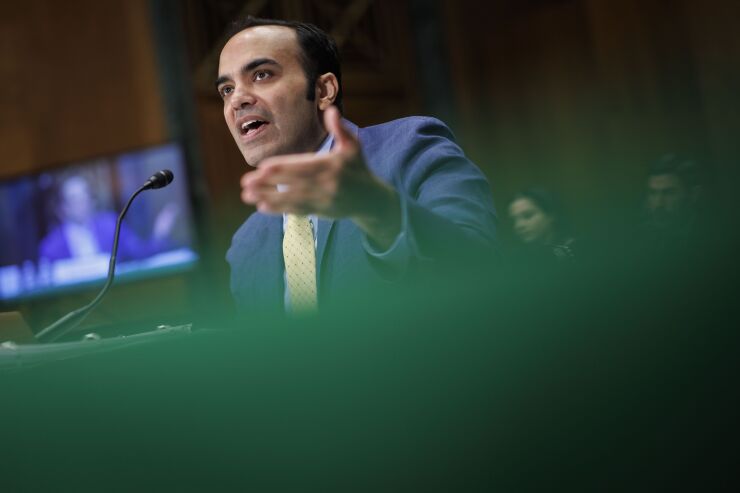
Consumer Financial Protection Bureau director Rohit Chopra defended the agency's actions — particularly its mortgage rules — as the Supreme Court is poised to hear oral arguments in a case that could undermine the bureau's authority and undo more than a decade of rules and guidance.
Speaking at an event Monday commemorating the 15th anniversary of the collapse of investment giant Lehman Brothers — an event that sparked the beginning of the 2008 mortgage crisis — Chopra said an unfavorable ruling in the case could have broad implications for financial stability.
"Any doubt about the legitimacy of the CFPB could be destabilizing," Chopra said in prepared remarks at a housing conference in Nashville.
The case,
In his speech, Chopra said the CFPB is no stranger to court challenges, but that the case could destabilize housing markets if the bureau is found to be unconstitutional and if its mortgage rules are deemed invalid.
"The case involving the CFPB has significant implications for the entire housing finance and financial regulatory system," Chopra said.
The CFPB
The Supreme Court case gives Republicans the best shot yet of gutting the agency and tying its funding to appropriations under a novel legal theory that the consumer watchdog is
Still, many experts think the high court under Chief Justice John Roberts is not going to second-guess how Congress funds federal agencies because doing so would invite legal challenges to the Federal Reserve Board and even far-flung agencies such as the Farm Credit Administration that has a similar structure. Moreover, no federal banking regulator is funded through annual appropriations.
In his speech, Chopra cited briefs filed by the Mortgage Bankers Association and U.S. Solicitor General Elizabeth Prelogar, who is representing the CFPB in the case. The CFPB has issued more than 200 rules on an array of products, from mortgages to auto loans, credit cards to debt collectors, that could be called into question if the Supreme Court rules against the agency.
"Reverting to a system without these regulations would create uncertainty for the mortgage industry and the economy," Chopra told attendees at a conference hosted by the Mortgage Collaborative. "Even putting aside the questions about existing rules, moving to a world where the future of housing finance oversight is uncertain and unknown, including the number of years we would be living under such mystery, should raise serious shared trepidations among market participants, financial markets, and consumers alike."
The MBA defended the mortgage rules enacted after the financial crisis, noting that "virtually all financial transactions for residential real estate in the United States depend upon compliance with the CFPB's rules, and consumers rely on the rights and protections provided by those rules." The MBA also said, in a brief filed in the case, that without the mortgage rules, "substantial uncertainty would arise as to how to undertake mortgage transactions in accordance with federal law."
Chopra also recounted how Congress "shook up the federal financial regulators," by shutting down the Office of Thrift Supervision and banning the Office of the Comptroller of the Currency from engaging in preemption of state-level consumer protections.
Congress "stripped authorities from the Federal Reserve Board of Governors, the Office of the Comptroller of the Currency, and other regulators that also failed in the lead-up to the crisis," he said. "It transferred these authorities to a new agency within the Federal Reserve System, the Consumer Financial Protection Bureau."
"Rather than allowing regulators to pass the buck or point fingers at one another, the CFPB would now be on the hook for examining banks and nonbanks across the mortgage industry and implementing and enforcing rules," Chopra said. "And rather than being funded by fees from its regulated entities, the CFPB would be funded by the Federal Reserve Banks, just like the Federal Reserve Board of Governors is."
Both the CFPB and Federal Reserve Board are funded from assessments on the Federal Reserve Banks. Congress directed the Federal Reserve Board to transfer funds to the CFPB for its operations, with its budget capped at 12% of the Federal Reserve System's 2009 budget, adjusted for inflation. The CFPB received $642 million in funding in fiscal 2022.
Though bank trade groups have stopped short of calling for the CFPB to be eliminated, they have supported legislation that would tie the bureau's funding to appropriations and restructure it from an agency run by a single director into a multiple-member commission.
The Supreme Court
While some in the industry think the six conservative justices will rule against the CFPB, other experts think the court would be opening a can of worms by challenging Congress' power of the purse.
Chopra said that the mortgage rules mandated by Congress have been "built into the entire fabric of the country's mortgage system," including marketing, origination, securitization, and servicing. Undoing those rules would present many problems, he said.
"Questions about those rules and the ability of the system to adapt to immediate and future challenges would raise significant concerns for the stability of the housing market and the financial system more broadly," Chopra said.





